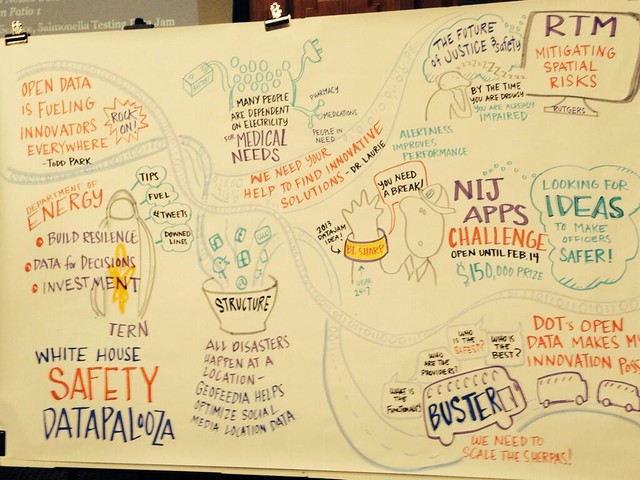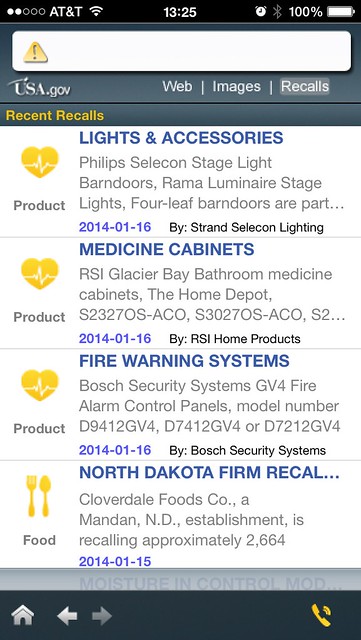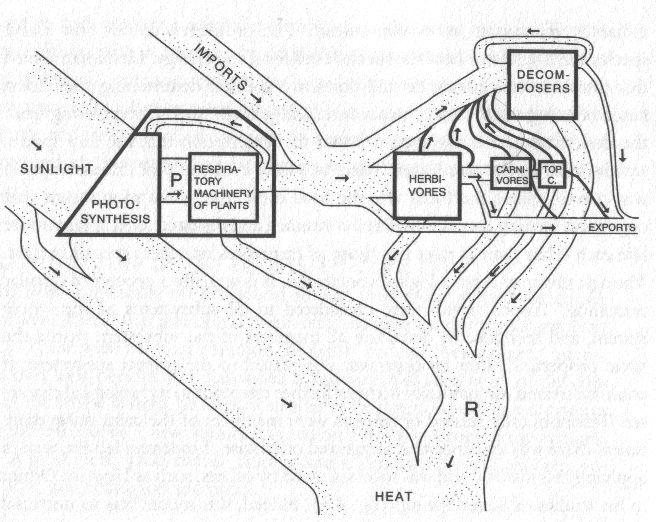At last month’s White House Safety Datapalooza, several federal agencies issued challenges to civic minded developers to help the federal government solve real world problems ranging from health care, public safety, education, and more.
Many of the previous winners of these challenges have been civic startups who have leveraged open data released on data.gov to help find creative ways to solve problems.

Sketchnotes at the Public Data Safetypalooa, courtesy @anadiazhernandz
Here’s a list of each challenge along with data resources and some examples of apps that work to solve similar problems. Try to win!
Consumer Product Safety Commission Challenge
Goal: To develop ways to put recall information in front of consumers.
The Consumer Product Safety Commission is responsible for making sure products used in the US are safe. Whenever a produce to deemed unsafe, the CPSC issues and alert to recall the product from stores and homes. Unfortunately, this information doesn’t always make it to consumers.
The CPSC SaferProducts Challenge has four different challenges:
1) Best mashup with online auction sales
2) Product reviews
3) Online Search
4) Best Innovation
Prize: $1,000 per challenge
Deadline: April 28th
Data Resources:
All Product Recalls API
Product Recall API on GitHub
Examples:
USA.Gov iPhone App:

Currently, the USA.Gov iPhone app has a section on the app that lists all the recent recalls using the Product Recall API. Clicking on a link in the feed will direct you to that specific agency website.
Department of Energy Challenge:
Goal: Submit an app that uses one of four engery.gov APIs
As part of the Administration’s commitment to a clean energy future, the Energy Department today is launching a contest to promote the creation of new apps designed to address today’s energy challenges. The Apps for Energy II contest, which is the second contest in the year-long American Energy Data Challenge, will encourage contestants to leverage ideas developed during the American Energy Data Challenge’s first contest, and open data sources.
Prize: $100,000
Deadline: March 9th, 2013
Data Resources:
- Green Button Data StandardA set of RESTful API methods and an XML data standard allowing consumers to access their energy usage data and securely share that data with third-party web and mobile apps. The Green Button standard has been adopted by 48 utilities. Over 42 million household and business customers (reaching well over 100 million Americans) already have access to their Green Button energy data. Learn more →
- Home Energy Score Tool APIThe Home Energy Score is similar to a vehicle’s mile-per-gallon rating. The Home Energy Score allows homeowners to compare the energy performance of their homes to other homes nationwide. It also provides homeowners with suggestions for improving their homes’ efficiency.The Home Energy Score Tool API allows developers to incorporate the tool’s scoring, recommendations, and other features into their own applications. Learn more →
- Commercial Building Energy Asset Score APIThe Commercial Building Energy Asset Score allows comparison of different buildings’ as-built energy systems while controlling for differences in building operations. It helps commercial building owners and operators gain insight into the efficiency of their building systems and identify potential upgrade areas.The Commercial Building Energy Asset Score API allows developers to incorporate the tool’s scoring, recommendations, and other features into their own applications. Learn more →
- The Buildings Performance Database APIThe Buildings Performance Database enables users to perform statistical analysis on an anonymous dataset of tens of thousands of commercial and residential buildings from across the country. Users can compare performance trends among similar buildings to identify and prioritize cost-saving energy efficiency improvements and assess the range of likely savings from these improvements.The Buildings Performance Database API allows developers to run queries against the database programmatically, and integrate the results into their applications, visualizations or analyses. Learn more →
- Energy Information Administration APIThe U.S. Energy Information Administration (EIA) collects, analyzes, and disseminates independent and impartial energy information to promote sound policymaking, efficient markets, and public understanding of energy and its interaction with the economy and the environment.The Energy Information Administration API provides a RESTful API to many of the EIA’s datasets, including 408,000 electricity data series and 11,000+ natural gas data series, with more being added every month. Learn more →
Other data sources include:
City of Chicago Energy Usage API
Examples:
OhmConnect
Ohmconnect customizes home improvement recommendations, so you can reduce your utility bill and your environmental impact.
Department of Justice Challenge:
Goal: The National Institute of Justice offers this Challenge as a call to design and create Ultra High Speed -compatible apps that measurably improve the efficiency and/or effectiveness of criminal justice and public safety services and operation.
Through this Challenge, NIJ seeks to encourage the development, use, and evaluation of UHS apps capable of improving criminal justice and public safety efficiency and/or effectiveness; and develop models for measuring and quantifying the specific impact of these apps. It is anticipated that this Challenge will help to accelerate the development and deployment of UHS applications in many other fields
Deadline: Phase I, February 14th
Prizes: $150,000
Data Resources:
- City of Chicago Crime Incident Report Data 2001-Today
- Department of Justice Arrest Analyst Tool
- NCVS Victimization Analysis Tool (NVAT)
- Chicago CAPS API (Community Policing)
Examples:
StreetCred
StreetCred Software helps police agencies find fugitives, get them out of the community and bring their officers home safely every day. It does this by combining information and data from the criminal justice system, courts, municipalities and other sources, analyzing it, then bringing predictively prioritized information right to the hands of the officers.
2nd Department of Justice Challenge:
Goal: Delivering Mission Critical Voice Communications for Law Enforcement and Public Safety Responders in the COTS LTE Environment
This Challenge seeks innovative solutions to providing mission-critical voice communications services for law enforcement and other public safety responders within the LTE Environment using commercial-off-the-shelf (COTS) technology, which are achievable within five years of the Challenge prize being awarded. For purposes of this Challenge, this capability is defined as instant communications with a defined set of mobile users either in a ‘one-to-all,’ ‘one-to-some’ or ‘one-to-one’ mode based on the supervisory responsibility of the user and/or the urgency of their need (e.g., threats to life, mission criticality) for access. The proposed solution should ensure mission-critical voice communications in all environments (e.g., urban, rural, wilderness) and in the face of communications infrastructure challenges, such as (1) where there is no terrestrial communications infrastructure; (2) where the existing infrastructure has been compromised or damaged; and (3) confined areas (e.g., subways, buildings, underground garages).
Deadline: Phase I, February 14th
Prizes: $75,000
Resources available to Chicago civic innovators:
Smart Chicago Collaborative offers a number of resources to developers building civic apps that would be useful when working on these challenges. These free resources include:
- Civic User Testing Group: the CUT Group is a first-of-its-kind effort to connect civic developers to real community members to foster co-creation and more usable, useful civic applications. CUT Group can provide large groups of citizens to help design and validate applications, and smaller focus groups to provide direct application feedback to developers.
- Hosting for Civic Apps: Smart Chicago maintains hosted webspace on both Amazon Web Service and Heroku.
- Google Apps for Business: SCC manages a Google Apps account through Google Apps for Nonprofits. This includes access to the Google Maps for Business API, which allows for very large daily geocoding limits, real-time transit information, larger static map images, and more.
- smartchicagoapps.org wildcard SSL: SCC owns a wildcard SSL certificate, which means that any application hosted using a *.smartchicagoapps.org subdomain can implement industry-standard SSL support free of cost.
- Github organization: SCC hosts many code repositories on its Github organization page, and coordinates development using the project issue trackers.
- Access to subject matter experts: SCC staff have deep connections with experts and policy makers within municipal government, and with technical experts with experience in building very large applications. SCC can work with developers to liberate data, solve tough technical challenges, go “behind the scenes” to see how technology can be used to solve civic problems, and place solutions in front of stakeholders and policy makers.






